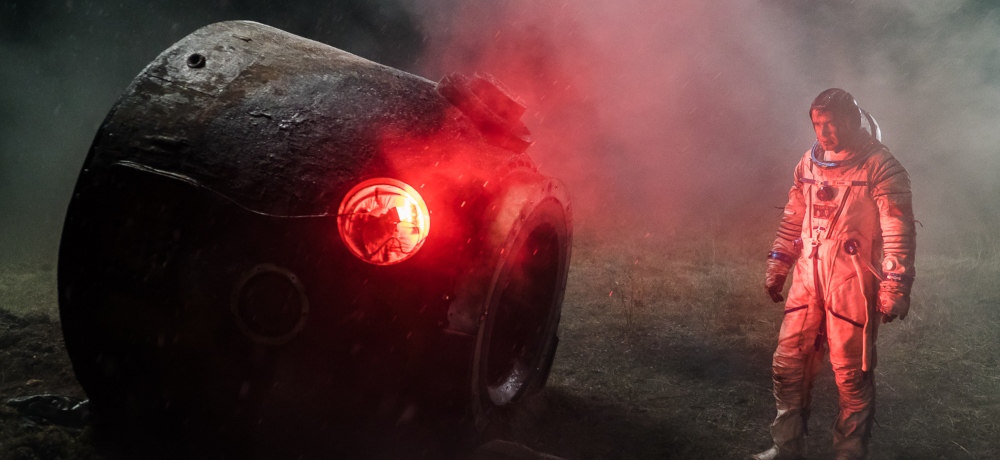


“Sputnik” is a word that means, most prominently, two things: various Soviet spacecraft which began with the first artificial satellite to orbit the Earth, and the origin of the word from Russian meaning “companion” or “fellow traveler.” This is a title that’s perfectly fitting to director Egor Abramenko’s first feature, the sci-fi horror film Sputnik, about two cosmonauts sent into orbit at the height of the Cold War, who return to Earth with a third passenger.
Set during a time of uncertainty and in a state on the brink of collapse, the film opens with the end of a space mission in 1983. Commander Konstantin (Pyotr Fyodorov) and co-pilot Kirill (Aleksey Demidov) are executing their descent when they’re hit with unexpected turbulence and power failure. Looking through the small, circular windows of their pod, they realize they’re not alone in the darkness. The film then cuts to the landing and the passerby who finds the two cosmonauts, both injured and bloodied, looking near death.
Following this discovery, the film introduces a new character, Tatyana (Oksana Akinshina). She’s a doctor of neuropsychiatry under investigation for some questionable practices. It’s these practices that get the attention of Colonel Semiradov (Fyodor Bondarchuk), who runs a research institute that’s now housing the returned astral heroes. Semiradov seeks her aid with a patient, specifically Konstantin, whom the institute’s doctor, Rigel (Anton Vasiliev), is struggling to come up with a diagnosis for a curious condition he’s suffering from since returning to Earth. It’s soon revealed to Tatyana that the source of Konstantin’s malady—which at first she mistakenly determines as PTSD—is an alien species living inside him. He can’t remember anything that happened before his landing, and the new mission presented in the film becomes trying to figure out what occurred during the incident in space and to learn everything they possibly can about the “companion” he brought back with him.
The alien feels like a main character in a way, as much time is devoted to it. Sputnik presents its own unique alien design that, while not as frightening as a xenomorph (Alien franchise) or as massive as a heptapod (Arrival), still manages to create terror, especially in moments of intense close encounters accompanied by a suspenseful, booming score by Oleg Karpachev. An alien brought to Earth or found on Earth is a narrative we’ve seen already in films like The Thing or Life, and what ends up being even more frightening in this new sci-fi flick is the horrific experimentation and government secrecy at this isolated facility where the film takes place.
Horror elements are present with some high-stakes action towards the end, but the film feels more like a sci-fi procedural drama. This isn’t at all a bad thing, as the investigation into this alien species and how it’s symbiotic with Konstantin never gets boring. But there is weakness to find in Oleg Malovichko and Andrei Zolotarev’s script. There are some occurrences that are never explained further, and despite making a point of wanting to figure out what occurred in space, it’s mostly left to the audience’s imagination. And without giving away spoilers, there’s a weird twist at the end that leaves you scratching your head, providing unnecessary backstory for one character while taking the emotion away from a very important part of another’s.
Despite faults in its script, the world-building and technical elements are all solid. The production design by Mariya Slavina and filming locations in Moscow carry with them an authentic Soviet atmosphere—attention to detail and construction that feels reminiscent of HBO’s Chernobyl—and the costume design by Uliana Polianskay is faithful to its time and place, even creating replicas of spacesuits from the era. The cast is quite good across the board, with Akinshina and Fyodorov being the standouts. They’re both stoic and serious in their roles, rarely offering a smile, and Fyodorov gets the most emotional role as he struggles to let go of the belief that the events of the film are punishment for his sins.
Egor Abramenko may not have won the Best Alien Movie crown with Sputnik, but it proves that the country’s up-and-coming directors show promise in tackling the genre, one whose national library is quite small. The film doesn’t feel highly original, but its setting and the dubious morality of its era do create a narrative that doesn’t drag. It has a premise that’s been explored many times before, but still remains interesting, and contains a message that may never not be true: men can be as monstrous as the monsters themselves.
Movie Score: 3/5